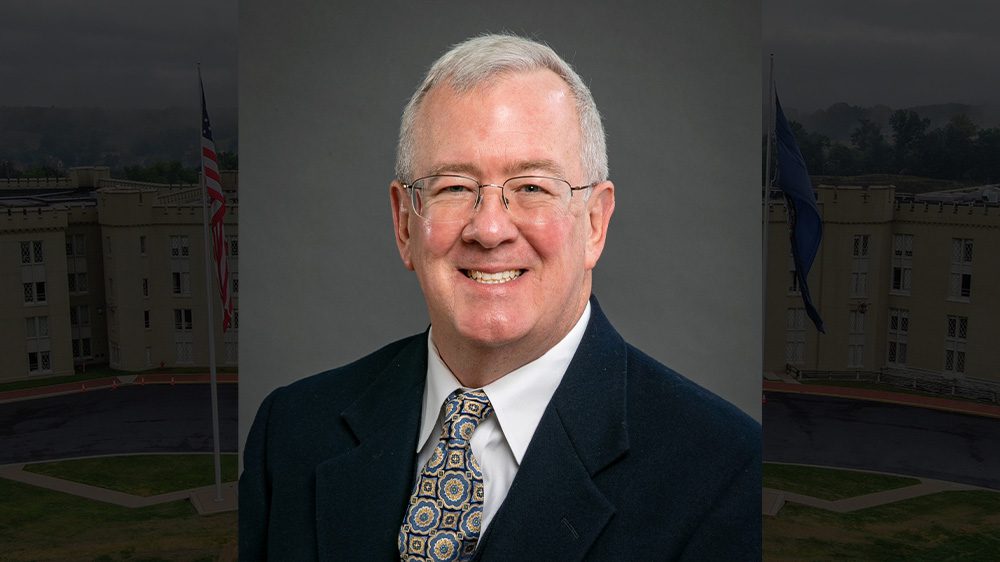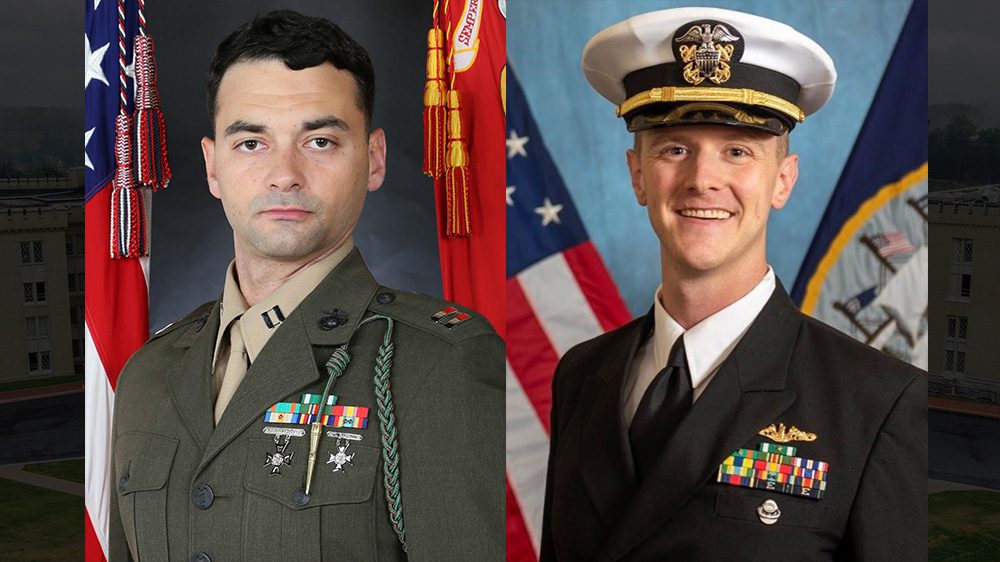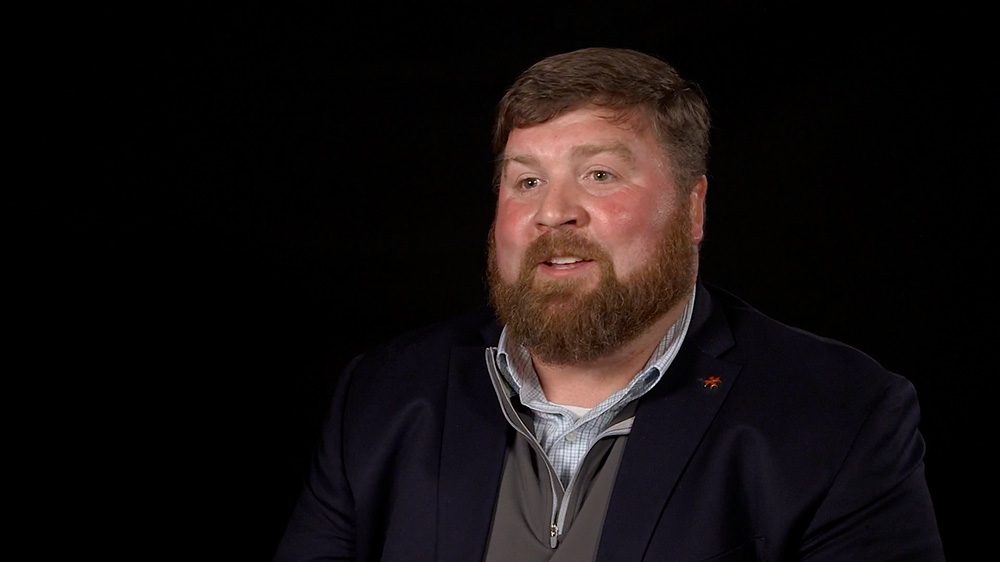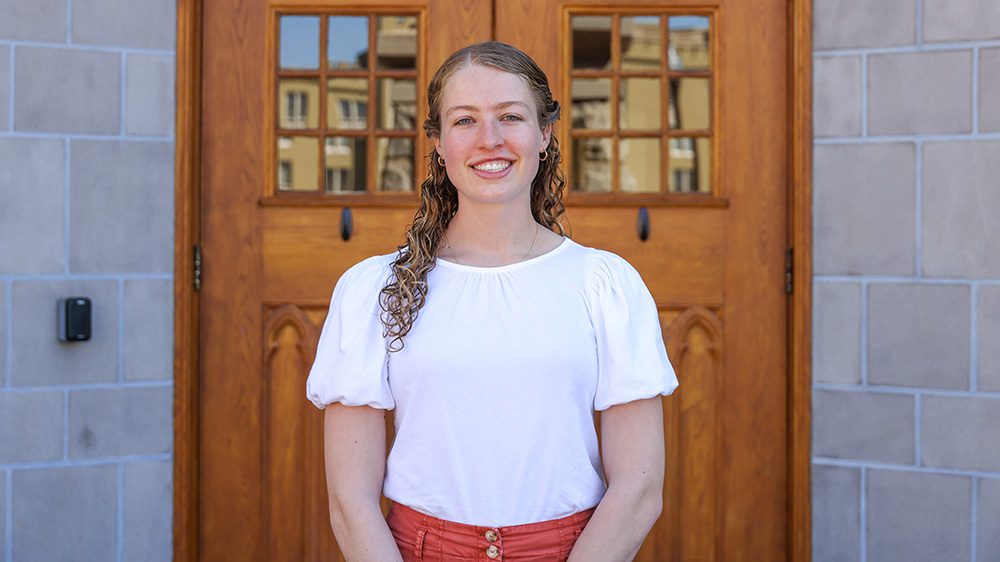Michael J. Hicks ’84, who is the George and Frances Ball Distinguished Professor of Economics at Ball State University and is teaching in VMI’s Department of Economics and Business during the first semester of the 2024–25 academic year, might be described as an unlikely economist and an equally unlikely academic. “I came to VMI because I wanted to be an Army officer,” Hicks said. “Also, my math teacher at Langley High School greatly admired Gen. Lemuel C. Shepherd [Class of 1917], under whom he had served in the Marines. He told me, ‘You’ll do well there.’”
Hicks originally planned to be an electrical engineering major, but that plan didn’t last past the first day of classes in fall 1980. He talked to one of the officers at the Army ROTC department, telling him he was an electrical engineering major and wanted to be an infantry officer. As Hicks recalls, on a piece of paper, the officer drew two widely separated circles and said, “One circle represented those who became infantry officers and the other represented electrical engineers.” He then suggested that Hicks study economics because “it is very hard, but not very useful.”
Hicks took the suggestion, changed majors, and then didn’t enjoy the major until, as a 3rd Class cadet, he took the macroeconomics course taught by longtime faculty member Col. Floyd Duncan ’64. “That was my awakening as a student of economics.” Therefore, when Hicks graduated as he had hoped, with a commission as an infantry officer, he also harbored the idea of going to graduate school. The only question was when.
The “when” turned out to be 1992, after Hicks had served eight years on active duty, been in a war (Desert Shield/Desert Storm), participated in a major peacekeeping mission in the Middle East, and spent, by his calculation, at least 1,000 nights in the field. “I had married, and my thoughts turned to family and a new career. So, it was time.” Hicks—who stayed in the Army Reserve and retired as a lieutenant colonel—began graduate school and eventually received a doctorate from the University of Tennessee in 1998.
Asked how well VMI prepared him for graduate studies, Hicks replied, “In the eight years I was in the Army, the world had changed, especially in technology. We had gone from punch cards to desktop computing. So, I had to adjust to that. Admittedly, I had graduated in the middle third of my class of economics majors. But VMI had given me some definite advantages. My economics education had had a broader focus than most other undergraduate programs, and I had learned to write.”
Since 1998, Hicks has taught and led research centers at Marshall University and the University of Tennessee and taught at the Air Force Institute of Technology’s Graduate School of Engineering. In 2007, he joined the faculty of Ball State University in Muncie, Indiana, as a professor of economics and director of the university’s Center for Business and Economic Research.
He has written three books, including “The Local Economic Impact of Wal-Mart.” In that work, he determined that the chain had not destroyed “mom-and-pop shops.” Rather, he noted that “Wal-Mart destroyed the organizations that destroyed the ‘mom-and-pop shops,’ like Kmart,” and described the retail giant as a “benign actor” in relation to local economies. He has authored or co-authored more than 50 scholarly articles. He has written a newspaper column on business and economics syndicated in Indiana since 2007 and has hosted “The Roundtable,” a monthly syndicated public affairs television show in Indiana. In addition, Hicks has appeared on C-SPAN, MSNBC, National Public Radio, and Fox Business News. Both scholarly and popular publications such as Rolling Stone, The Economist, the Wall Street Journal, the New York Times, and the Washington Post have cited his work extensively.
He has served on the Indiana Governor’s Council on the Water Economy, the West Virginia Special Reclamation Fund Advisory Council, and on the advisory board of West Virginia Small Business Development Centers. He has been involved in various professional organizations related to economics and public policy, and he has received 20 awards for his service, publications, research, and teaching.
For most of his career, Hicks’s research has focused on public policy at the state and local levels. He describes its focus in terms of two simple questions: Where do people move? Where do businesses move? “They speak,” says Hicks, “to the core interest of every government, which is attracting more people to live in its jurisdiction. This is their core interest because businesses follow people—not the other way around.”
This is a pressing issue, according to Hicks, because half of America’s more than 3,100 counties are losing population. “People are mobile. If they think where they live is losing ground, they’ll leave. If businesses see a city or county is losing population, they’ll think twice about setting up shop in it.” State and local governments, therefore, must maintain and grow their populations. In his current research, soon to be a book, Hicks is examining which policies can accomplish this. “So much of it comes down to ‘quality of life’ issues. One of them is public safety. Are the streets safe? Another is recreational facilities. Do you have a public park system that is safe and clean and offers people opportunities to enjoy themselves? Infrastructure is important as well. Are your roads in good repair? Is your downtown clean?”
Yet, Hicks recommends that state and local governments focus on “developing and maintaining high-performance schools.” He bases this recommendation on the fact that “the quality of schools often is the top concern of families. People are willing to pay a premium in housing prices to live in places with good schools. In fact, research has shown that one-third of home pricing differences are related to school quality. Parents who have higher levels of education prioritize high-quality education for their children, and those parents often are entrepreneurs who have the potential to establish new businesses wherever they live.”
“I don’t know how you can come back here with an open mind and not be blown away by how strong VMI is now, how much better it is in so many ways. There is a high quality to everything here.”
Michael J. Hicks ’84
Even if the quality of the schools doesn’t necessarily attract new business—the regulatory environment and tax policies matter, too—Hicks asserts the effort is worthwhile. “If nothing else, you have provided your citizens with a better start in life and a brighter future.” He points to Mississippi, which has made increasing rates of literacy and college attendance goals of its educational system. “Currently, thanks to state and local efforts, 80% of high school graduates go to college. Now, everyone is aware that not all of them will finish college. But research has shown that even a single semester of college helps boost a student’s earning potential.”
Asked what he has enjoyed about being an academic, Hicks said, “What makes my career so satisfying is what made my time in the Army so satisfying. I led young soldiers and, at one time, commanded a basic training company. It was extremely rewarding to work with 18 to 25-year-olds who are taking a big step toward transitioning to adult life. It’s the same with college students. Moreover, you are working on something bigger than yourself, and that’s always satisfying.
“I have also led an economics research center for more than 17 years,” he continued. “I have liked that work because of our focus on state and local issues. No matter their party affiliations, most people in state and local government are looking to solve pressing problems and make their jurisdictions better places to live and work. To do so successfully, they must tackle tough issues, like taxes and spending, and I get a lot of satisfaction helping them do that.”
This semester, Hicks holds the Mary Moody Northen Chair in Economics. He finds that a little amusing. “I was on the color guard that posted the colors for the celebration of her 90th birthday in Moody Hall. So, I’ve come full circle in a way. And I must say I cannot thank her enough for establishing that chair.
“The head of the economics and business department, Colonel Jeff Smith, asked me to apply for the position, and I was excited to come to one of the better undergraduate-focused economics departments in the country,” Hicks explained. “It truly is satisfying to see how strong the education is that cadets receive in the department. My son, Nathan, Class of 2023, was an economics and business major, and he was doing what I’d call MBA-quality work as an undergraduate. It is hard to overstate the excellence of the education cadets receive. It’s as strong a program as I have ever seen.” Asked to explain the foundation of this excellence, he replied, “There is an intense focus on teaching and a genuine commitment to ensuring that all aspects of the program complement each other. In the end, it is all about preparing cadets to do whatever it is they want to do.”
Working and living on post also has given Hicks a close look at the current state of the Institute and the Corps, and what he has seen impresses him. “In a lot of ways, the experience is tougher and more demanding. The expectations in terms of professionalism and leadership are an order of magnitude higher than when I was in barracks—and the cadets meet them. And it’s not just the cadet officers who do so, but also the cadet NCOs, class leaders, the General Committee, and the Officer of the Guard Association.”
“Also, there are more chances for real leadership here. The cadets are eager to take on more responsibility and to do their best when they get it. The Corps really owns it, and they take pride in that.”
Another aspect to the Institute that Hicks appreciates is what he calls “a culture of respect.” There is an elevated level of mutual respect throughout post, he says, and it’s not limited to the Corps. “The faculty respect each other. The staff respect the faculty. The coaches are respected, as are the people we might not often think about—the people who work in Physical Plant, the laundry, Crozet. My wife, Janet, has noticed it as well, and she’s hugely impressed by it.
“That culture of respect is essential to an organization because you can’t do much unless you have it. But it isn’t created overnight, and it’s not easy to maintain. So, I give a lot of credit to General Peay and Major General Wins for what they have done to build and foster that culture.”
Overall, he is struck by the high level of excellence throughout post. “I don’t know how you can come back here with an open mind and not be blown away by how strong VMI is now, how much better it is in so many ways. There is a high quality to everything here. I have not seen anything that isn’t at least an ‘A-.’”
He concluded by saying that VMI can be this strong because of a “hidden advantage.” “I am directly benefitting from it,” he explained. “It is the generosity of our donors, the alumni and friends, like Mrs. Northen, who established endowments and have consistently given to VMI over decades. Without their generosity, cadets would not have the opportunities they do today – and I might not have had the opportunity to return to teach.”
-

Scott Belliveau '83 Communications Officer - Executive Projects
The communications officer supports the strategy for all communications, including web content, public relations messages and collateral pieces in order to articulate and promote the mission of the VMI Alumni Agencies and promote philanthropy among varied constituencies.




